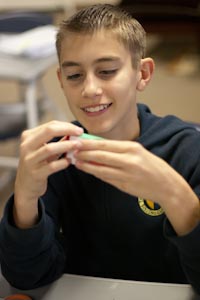With the inauguration of the Dialectic stage at The Cambridge School, new subjects have been developed and introduced to the seventh grade class. Of the new subjects, the one that often gets the most attention at this stage is Logic. Typically if a person ever encounters a Logic course it is an elective at college, while many people will have received any number of degrees without ever having to take Logic; therefore, it is only natural that questions arise when a young school formally introduces logic to students entering the seventh grade. As the Logic teacher, I’ve been elected as a relevant authority equipped to satisfactorily answer some of these hypothetical questions; whether this appeal to authority is fallacious or not remains to be seen (a little logic joke there—please hold your applause until the end). And while some of your questions might take more nuanced forms I hope that my broad approach will prove helpful. Let’s first tackle the “What?” and “When?”
What?
As any of the seventh graders will enthusiastically recite: logic is, most basically, the science that evaluates arguments (though Aristotle would prefer we say “the art of testing and upholding arguments”). While logic within Cambridge’s curriculum will serve many purposes, its explicit aim at the beginning is analytical: we look at a variety of arguments and attempt to understand if and how those arguments work logically and then to what degree of effectiveness.
Written by: DJ Goodwiler, Lead 7th Grade & Logic Teacher
Read more in the Fall 2012 Courier





